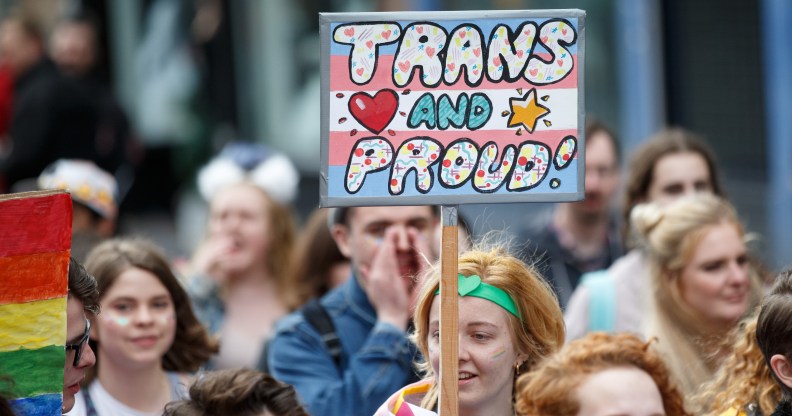Anti-trans ‘concerns’ over ‘experimental’ puberty blockers have reached Sweden

A participant holds a sign saying “Trans and Proud” during the Glasgow Pride. (Robert Perry/Getty Images)
The anti-trans claims that healthcare for transgender youth is “risky” and “experimental” have reached Sweden, amid warnings that “media hatred” of young trans people is having a damaging effect.
Last week, a prominent Swedish journalist dedicated every episode of her nightly TV chat show to the rise in the number of teenagers being diagnosed with gender dysphoria.
But no one from the trans community took part in Malou von Sivers’ programme.
Lukas Romson, one of Sweden’s leading trans activist, told The Guardian: “There will be no serious trans activists in the show, because none of us trusts Malou at all.
“I’m afraid she’ll just use us.”
Romson added that the devotion to trans issue by a mainstream, cisgender journalist like von Sivers demonstrates how much public attitudes towards trans people have shifted in Sweden over the past few years.
“It’s been a very big change and very sudden,” Romson said. “Everyone – but especially young people – feels worse because of what they perceive as the media’s hatred of them.”
Von Sivers’ programme was based on figures from Sweden’s health authority showing that over a ten-year period, there was a 1,500 per cent rise in the number of trans boys being diagnosed with gender dysphoria.
The increase in diagnoses – which experts say they don’t have a clear reason for, but which matches an increase in the numbers of UK teenagers being diagnosed with gender dysphoria – led, in March 2019, to a Swedish psychiatrist writing for a leading newspaper that internationally approved healthcare for trans teens is “a big experiment”.
This claim is consistent with anti-trans statements made in the UK media, which suggest that puberty blockers – the most common medical treatment for trans teenagers, which pause puberty until the person is old enough to make bigger decisions about whether they want other transition-related healthcare – are dangerous.
A landmark January 2020 study that found giving puberty blockers to trans teenagers who want them significantly reduce their suicide risk and chances of developing short- and long-term mental-health problems.
In Sweden, anti-trans claims in the media have led to government plans to change the age at which young people can access gender-confirmation surgery being shelved.
Romson said this turn of events is worrying, and he blames a group called Gender Identity Challenge Scandinavia (GICS) – which he frames as a group of “so-called concerned parents” – for the change in the public debate on trans issues.
Sweden is often seen as being a progressive country when it comes to LGBT+ people. In 2018, it became the first country in the world to offer compensation to trans people who were sterilised in order to have their gender recognised.

